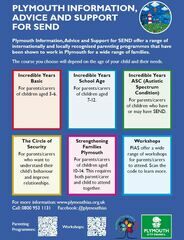- 01752 258933 / 0800 953 1131
- pias@plymouth.gov.uk
- National Helpline

Children and young people with SEN all have learning difficulties or disabilities that make it harder for them to learn than most children and young people of the same age. These children and young people may need extra or different help from that given to others.
Many children and young people will have SEN of some kind at some time during their education. Early years providers (for example, nurseries or childminders), mainstream schools, colleges and other organisations can help most children and young people succeed with some changes to their practice or additional support. But some children and young people will need extra help for some or all of their time in education and training.
Children and young people with SEN may need extra help because of a range of needs. The SEND Code of Practice: 0-25 Years set out four areas of SEN:
The basic principles you need to keep in mind when thinking about your child’s needs are that all children have a right to an education that enables them to make progress so that they:
All children with special educational needs (SEN) or disabilities should have their needs met, whether they are in early years settings (like a nursery or a childminder), in school or in college.
When making decisions about SEN or disabilities, the local authority must:
Parents should have a real say in decisions that affect their children, should have access to impartial information, advice and support (Plymouth Information, Advice and Support for SEND) and know how to challenge decisions they disagree with.
Local authorities must also involve children, their parents and young people in developing local provision and services for children with special educational needs and disabilities.
Further details on the principles can be found in chapter 1 of the SEND Code of Practice: 0-25 Years.
If you are worried about your child’s education you should talk with your child’s education setting this is usually the class teacher. They will discuss any concerns that you have, tell you what they think and explain to you what will happen next. If you would like independent impartial support you can contact Plymouth Information, Advice and Support for SEND who will be able to advise and support you at any meeting.
Children and young people with SEN all have learning difficulties or disabilities that make it harder for them to learn than most children and young people of the same age. These children and young people may need extra or different help from that given to others this is known as SEN Provision.
A disability is described in the Equality Act 2010 as ‘a physical or mental impairment which has a long – term (a year or more) and substantial adverse effect on their ability to carry out normal day-to-day activities.’ This includes, for example, sensory impairments such as those that affect sight and hearing and long-term health conditions such as asthma, diabetes or epilepsy.
SEN Provision means educational or training provision that is different from that made generally for other of the same age in mainstream maintained settings across the whole of England.

| Cookie | Duration | Description |
|---|---|---|
| cookielawinfo-checkbox-analytics | 11 months | This cookie is set by GDPR Cookie Consent plugin. The cookie is used to store the user consent for the cookies in the category "Analytics". |
| cookielawinfo-checkbox-functional | 11 months | The cookie is set by GDPR cookie consent to record the user consent for the cookies in the category "Functional". |
| cookielawinfo-checkbox-necessary | 11 months | This cookie is set by GDPR Cookie Consent plugin. The cookies is used to store the user consent for the cookies in the category "Necessary". |
| cookielawinfo-checkbox-others | 11 months | This cookie is set by GDPR Cookie Consent plugin. The cookie is used to store the user consent for the cookies in the category "Other. |
| cookielawinfo-checkbox-performance | 11 months | This cookie is set by GDPR Cookie Consent plugin. The cookie is used to store the user consent for the cookies in the category "Performance". |
| viewed_cookie_policy | 11 months | The cookie is set by the GDPR Cookie Consent plugin and is used to store whether or not user has consented to the use of cookies. It does not store any personal data. |